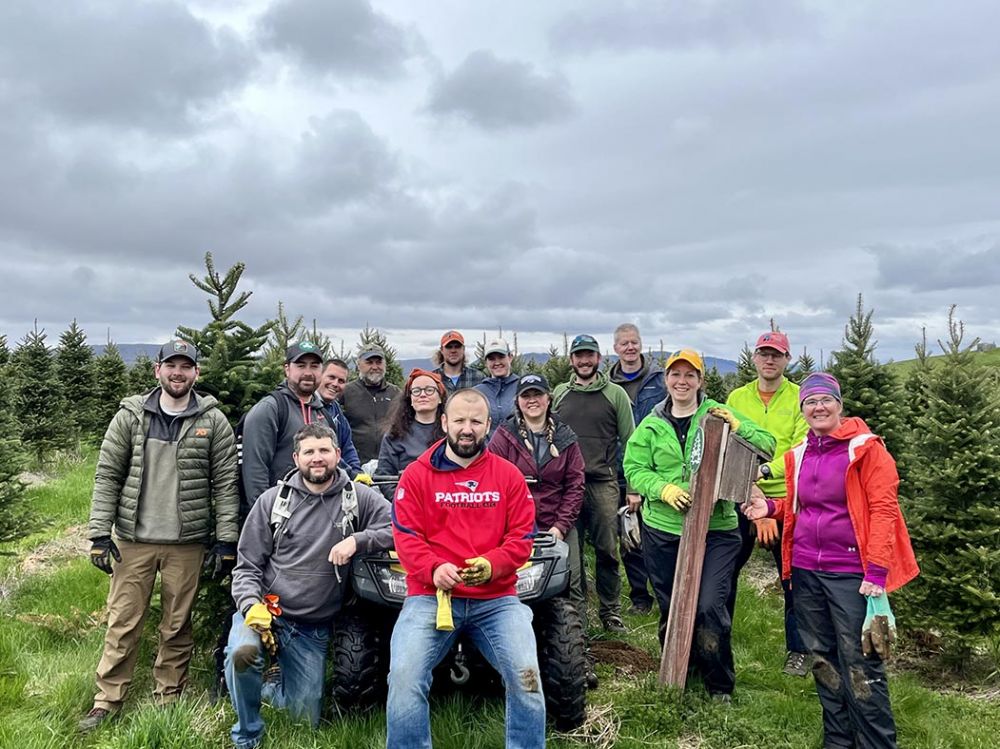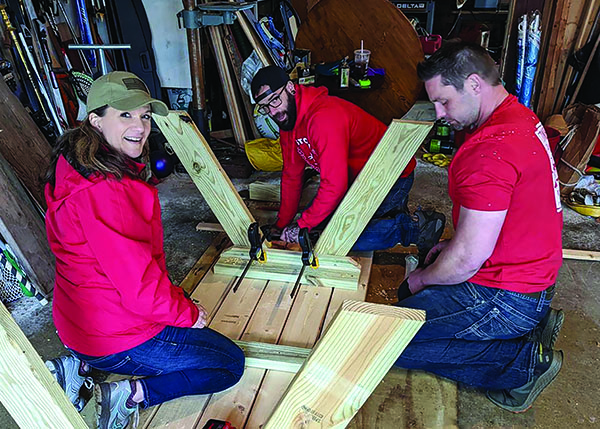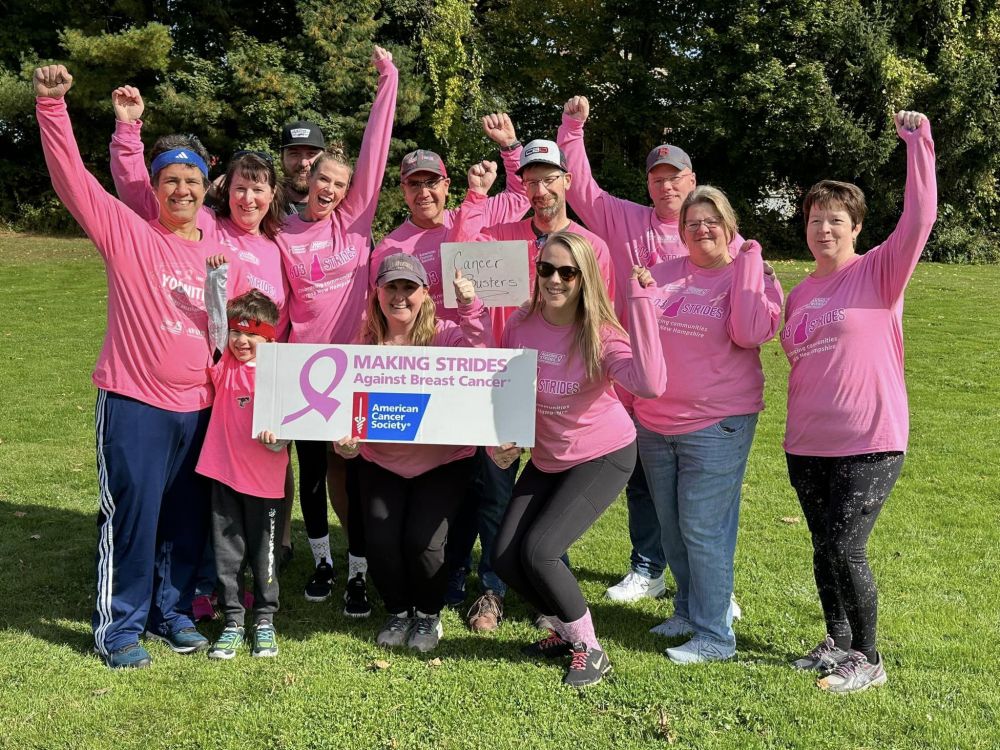 Team members at Mainstay Technologies volunteering at a tree farm. (Courtesy of Mainstay Technologies)
Team members at Mainstay Technologies volunteering at a tree farm. (Courtesy of Mainstay Technologies)
According to the Chronicle of Philanthropy, while corporate contributions have increased in inflation-adjusted dollars since the 1990s, companies are donating a smaller share of pretax dollars. A 2023 report by Giving USA found that 2022 was one of the worst years in philanthropy history. The report shows that individuals, bequests, foundations and corporations gave an estimated $499.33 billion to U.S. charities in 2022, a 3.4% decline from the $516.65 billion donated in 2021. Only 6% of donations last year came from businesses.
The NH Charitable Foundation experienced record giving in 2020-21 during the pandemic, but charitable giving declined in 2022. “Giving was down across the board nationally, and this is probably due to inflation and economic uncertainty,” says Kristen Oliveri, vice president of communications and marketing for the NH Charitable Foundation. “It’s certainly not because need has declined. It’s a challenging time for nonprofits and the communities they serve, and we hope corporations and individuals will dig deep.”
The NH Charitable Foundation works with individuals and businesses to show them where community needs exist. In addition to corporate advised funds, the foundation offers flexible funds that allow Foundation staff to make grants in communities where they are most needed.
“Twenty or twenty-five years ago there may have been 12 strong companies locally owned in a community, but today the landscape has changed,” says Melinda Mosier, vice president of donor engagement and philanthropy services for the NH Charitable Foundation. “In terms of a donor base and revenue source, nonprofits can’t be dependent just on corporate giving.”
Kathleen Reardon, CEO for the NH Center for Nonprofits, says there are still many companies in NH that continue to step up their support of community needs. What drives a company to give and the ways giving is carried out varies from company to company, she says. The bottom line, Reardon says, is that building communities where businesses can thrive requires “companies being invested” in those communities.
“New Hampshire is a small-government state and nonprofits play an outsized role,” says Patrick Tufts, president and CEO of Granite United Way, which serves much of the state with a mission to create healthy communities.
Tufts, who has been with the United Way for more than 20 years, says he is concerned about the loss of public money following the pandemic. “Where is the revenue going to come from? Are organizations going to be able to sustain programming that’s been in place for the last couple of years, or are we looking at a little bit of a cliff situation?”
Tufts says he is confident that 2024 will be a successful year for emerging partnerships but cautions that a steady stream of funding will be required to make sure community needs are met.
One area in need of funding is child care, Tufts says. “What is there is not enough to maintain capacity,” he says, adding the Granite United Way has been the top funder for child care programs, such as the Whole Village Family Resource Center in Plymouth, throughout the state.
Recently, Tufts says, the Granite United Way was awarded a contract from the state of NH to convene the business community to address the child care shortage and the impact it is having on businesses. “We want to hear their thoughts on strategies. What are businesses willing to do to improve access to safe, local child care? Are they willing to help facilitate that financially?” Tufts asks, explaining the Granite United Way would like to create a list of family-friendly businesses in the state that have policies in place that allow their employees access to child care.
A Range of Ways for Businesses to Give
Each community has different needs, and each company can choose issues they would like to address, says Mosier. “Some folks want to meet basic needs by putting food in hungry bellies, some want to change the systems through advocacy and policy change,” she says, citing a push to expand Medicaid several years ago. “We will always try to find where their lens is and where they’re coming from with a focus on racial justice, economic security, youth support, substance misuse and mental health, and environmental protection.”
Businesses give to nonprofits in a variety of ways—direct donations, setting aside a percentage of sales for donations, scholarships, providing employees with paid time off to volunteer, holding companywide fundraising events, appointing an employee committee to direct company giving, providing employee donations, donor-advised funds and more.
Reardon says businesses’ philosophies on giving are varied, and the best examples of corporate giving are when nonprofits and businesses have an alignment between their goals and strategies. “We’ve seen some evolution over time. Some corporations have separate charitable foundations and others do their funding through HR and marketing; this can be a way of engaging employees,” she says. “There are a wide variety of ways to give that reflect a company’s overall strategy.”

Amanda Grappone Osmer, one of the owners of Grappone Auto Group, says the company donates 5% of its net profit to charity each year. “This is a family business, and giving is part of our personal philosophy; it’s the right thing to do,” Grappone Osmer says, quoting the company’s mission statement, which calls for “Dedication to building lifelong relationships with its team members, guests, and community while serving with integrity, kindness, and respect.”
Grappone Automotive also encourages employees to volunteer their time through the “Grappone in The Community” program that offers employees a $250 mini-grant—delivered by Grappone Osmer in person— and eight hours of paid volunteer time to contribute toward a nonprofit organization of their choice.
The origin of the volunteer program, Grappone Osmer says, began with conversations she had with her father nearly 20 years ago. “I remember walking down the hall at the corporate offices with my dad and talking about the joy of being able to volunteer,” she says, explaining that these conversations included coming up with ways to remove barriers like time and money for people. “I said, ‘Dad, let’s take those barriers away and provide the money.’”

Associated Grocers of New England in Pembroke makes volunteering and donating part of the company culture, says CFO Cindy Caldwell. Employees serve meals at Concord’s Friendly Kitchen and are directly engaged financially through the “Employees of AG of New England & AG Supermarkets” donor-advised fund at the NH Charitable Foundation. Employees can contribute to the fund—primarily via payroll deductions starting at $1 per week—and the company kicks in an additional 25% on every dollar.
The program, dubbed Community Connection, raises between $70,000 and $80,000 annually. AGNE’s Community Connections Committee interviews various nonprofits in the Concord and Manchester communities to be part of the program. Over 20 years, Associated Grocers has donated $1.4 million dollars that have gone to nonprofit organizations addressing elderly housing, hunger, veterans and children’s needs. “We take our mission, which includes a supportive employee environment and concern for our communities, very seriously,” says Caldwell. “We live and breathe it every day.”
And it’s not just direct monetary support, Caldwell says. The company also supports the Special Olympics, sponsors a breast cancer walk each year and provides employees with 24 hours of paid time off to volunteer annually. “It’s a combination of monetary support and volunteerism that goes along with our mission statement about participating in the communities we serve,” Caldwell says, adding that Associated Grocers also participates in Allenstown’s Old Home Day by providing the fireworks. “It’s easy to write a check, but to give time is different and it’s very impactful. A lot of agencies need the bodies.”
Mainstay Technologies, an IT firm with locations in Manchester and Laconia, has historically donated $40,000 annually through a donor-advised fund at the NH Charitable Foundation. CEO Ryan Barton says the company wrestles with the role of business in charitable giving. “We want to be a long-term part of a flourishing community. The question is how to do that best over the longest time scale. It’s easy to give a check and feel better, but as we have carefully studied this, we currently see the integration of work and community happening best through the individual lives of team members. And so, we provide volunteer time, education on philanthropy, and extra profit sharing with an easy process for pre-tax donations to charities as each team member sees fit.” Mainstay is monitoring the results and looking to continue to grow impact.
Barton explains that Mainstay also has a responsibility to offset its environmental footprint. The company recently reached a major goal of becoming a net-zero company through green power, emissions reductions and careful, New England-focused offsets. Mainstay has also helped fund three different NH charities’ green initiatives: The Granite Y, Lakes Region Community Developers and Squam Lakes Science Center. These projects, Barton says, save each nonprofit cost in perpetuity while eliminating CO2 emissions through efficiency or green power generation.
Mosier says a company’s decision on where and how to give often involves strategies that benefit communities and engage employees.
Samantha Pause, chief innovation and brand officer for Mascoma Bank in Lebanon, says the bank’s vision is to be a force for positive change for its customers, communities and employees. Because of this, she says, the 124-year-old mutual bank focuses heavily on the financial health and wellness of the communities it serves.
“We’re a values-driven organization, and we’re also a certified B Corporation,” Pause says, explaining that B-Corps are evaluated by outside organizations that assess the bank’s impact on its customers, the communities it serves, the environment, its employees and how it is governed.
Pause says Mascoma gauges a community’s vitality and its needs in terms of the quality of education, health care or the arts, as well as other factors. “We need these things to bring people here and have them stay here,” she says, explaining that several years ago, the bank focused on making an impact with racial equity. While hiring and lending practices were examined, Pause says bank leaders wanted to make sure money given to address racial equity would have a measurable impact. They decided to support organizations that provide micro loans—small loans, often under $5,000— for people wishing to start businesses.
Mascoma partnered with the Vermont Community Loan Fund and funded a three-year position titled Business Navigator, by donating $180,000 over three years. “That person’s role is to get into communities, to build trust, and to get an understanding of the people within the community and the organization supporting them,” Pause says. This involves helping people access not only micro loans but access to marketing and business planning as well. “There is a lot of support out there, but a big part of finding it is making the connection for people. And that can be more impactful than just writing a check.”
Partnerships and Collaborations
One of the ways the NH Center for Nonprofits has found success meeting community needs, Reardon says, is with its online “NH Gives” initiative, a 24-hour online-giving event held each year. In 2023, NH Gives raised $3,544, 948 from 15,318 donors for 610 nonprofits. “This is a good example of all the diverse ways companies give,” Reardon says. “Some sponsor the day overall; some companies provide in-kind support through social media and in other ways.”
Reardon says the takeaway from the NH Gives initiative is that all businesses, both large and small, make a difference. “It doesn’t matter how large or small. That’s what’s exciting to us.”
Both the NH Charitable Foundation and Granite United Way help businesses and nonprofits make the right connections and help businesses find the right tools to make the kinds of investments that can have the greatest impact in the community.
“We want to support issues and areas affecting employees, like child care and transportation,” says Mosier.
Tufts says he enjoys being a matchmaker between businesses and nonprofits. “It’s fascinating work because you get to really see the community as groups of organizations who are trying to make a difference in their specific areas,” he says, adding that building partnerships amongst organizations with similar missions is gratifying. “The sum of the parts of multiple organizations are stronger than anyone trying to tackle issues on their own.”
And he has a lot of hope for 2024. “Organizations really understand there’s limited resources out there and that by nature, we’re not here to compete with each other. We’re here to collaborate.”

 Current Issue - May 2024
Current Issue - May 2024